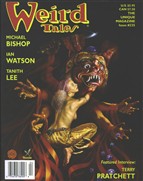"Lambert, Lambert" by Ian Watson
"The Coffin Merchant" by Richard Middleton
"Midnight" by Tanith Lee
"Fig" by Robert Ferrigno
"The Sacerdotal Owl" by Michael Bishop
 The first story of this issue, "Lambert, Lambert" by Ian Watson is one of the strangest and most delightful pieces of short fiction I've seen in a while. It is written in second person (which I normally dislike), but the tone is so genuinely conversational that it feels natural rather than contrived. Not "build your own adventure" tone, but that of a friendly guy who's chatting you up at a bar. Except that it's not a bar but a near-future prison camp for "pinkos and greens," and the guy is not only friendly, but also quite creepy. Lambert Brown, inspired by his namesake (the historical Daniel Lambert, the fattest man of his time), finds some creative ways of fighting prison overcrowding. Of course, the aforementioned ways involve cannibalism and the fourth dimension, but don't worry, fellah… you'll like it in here. This story is highly recommended to those who don't mind shuddering and giggling at the same time.
The first story of this issue, "Lambert, Lambert" by Ian Watson is one of the strangest and most delightful pieces of short fiction I've seen in a while. It is written in second person (which I normally dislike), but the tone is so genuinely conversational that it feels natural rather than contrived. Not "build your own adventure" tone, but that of a friendly guy who's chatting you up at a bar. Except that it's not a bar but a near-future prison camp for "pinkos and greens," and the guy is not only friendly, but also quite creepy. Lambert Brown, inspired by his namesake (the historical Daniel Lambert, the fattest man of his time), finds some creative ways of fighting prison overcrowding. Of course, the aforementioned ways involve cannibalism and the fourth dimension, but don't worry, fellah… you'll like it in here. This story is highly recommended to those who don't mind shuddering and giggling at the same time.
Richard Middleton's "The Coffin Merchant" first appeared in 1912. While the plot is predictable (a young man receives a handbill advertising a funeral service from a stranger. Guess what happens next?), the Victorian prose is quite enjoyable. I always had a soft spot for well-rendered turn of the century London, and this short tale satisfies with vivid descriptions and lovely period writing. I guess I'll have to go and get me a collection of Richard Middleton's short stories.
"Midnight" by Tanith Lee is quite pretty, and her writing sparkles and shimmers and takes your breath away. Thus, I was somewhat disappointed that all this beauty was spent on a fairy tale retelling. "Cinderella" retelling, to be exact. Although the ending of Tanith Lee's version is somewhat different from the conventional one, it is not different enough to justify yet another "Cinderella" rehashing.
Another retelling is "Fig" by Robert Ferrigno, a flash version of the Adam and Eve story told from the point of view of the Tree of Knowledge itself. While the piece is nicely written and funny in places, it does not really satisfy. So the fruit of knowledge was a fig, not an apple. And the whole thing was a set up by God. It was a fun, quick read, but not much else.
"The Sacerdotal Owl" by Michael Bishop is the longest piece in the issue, and it is a great read. It starts out as your typical Indiana Jones-style adventure yarn, when a young woman, Lace, arrives to a remote South American settlement to marry her archeologist fiancé. But the tone and the expectations change quickly, as the focus shifts to the embattled country – the rebel guerillas in the jungle, the Western-backed regime, the slashed-and-burned rainforest. Yet, the story of Lace and a young man of Mayan ancestry, and their travel to the ancient temple where her fiancé is held hostage never lets up, and the tension builds nicely. This story combines several virtuesfast pacing, exotic locale, forays into history, religion and politics, and evocative, poetic language.
Throw in some ancient gods, human sacrifices, and the Mayan afterlife, and you've got a great adventure story. But the deeper undercurrent of brooding reflection on the role of Western civilization in the environmental and cultural destruction makes this story more than it appears to be in the beginning. While some might not care for the social commentary being mixed in with their archeological adventure, I found that this aspect set the story apart.
Overall, a very good issue, especially the opening and the closing stories. In addition to fiction, there were quite a few poems, nice illustrations, and features. Among the latter, the interview with Terry Pratchett is well-deserving of attention.